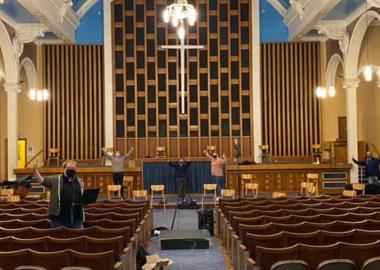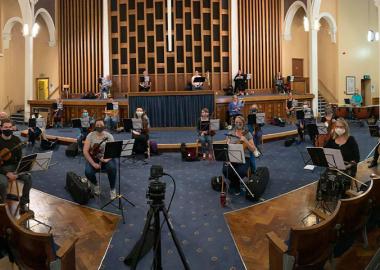Sophie Anderson, Publicity Officer of Sheffield Philharmonic Orchestra (SPO) tells us how the orchestra has managed to successfully diversify its repertoire.
Background
Formed in 1945, the SPO is Sheffield’s oldest leisure-time orchestra, with over 80 members from across the Sheffield city region and beyond. We endeavour to present high-quality, well-attended concerts that engage regular concert-goers, and actively seek to increase exposure to classical music by working with the local community.
The challenge
Before 2018, the SPO went through a challenging period where audience numbers were dwindling, and so were the accounts. Things were not desperate, but we knew the ensemble may not survive another decade if nothing changed. To tackle this, we began developing a strategic action plan to increase audience numbers and achieve financial stability.
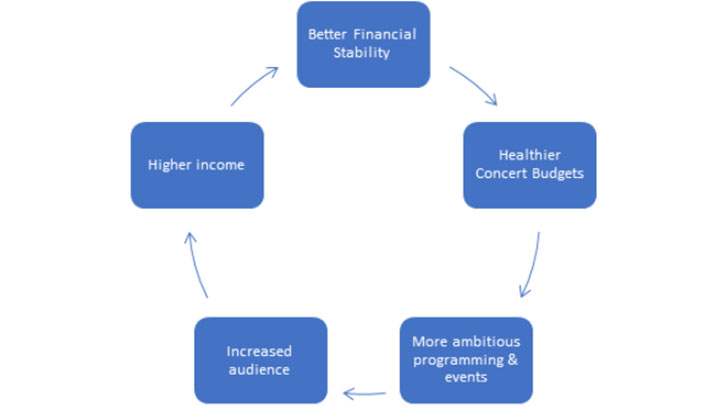
Flowchart from SPO action plan
This strategy also contained several other areas of focus: audience development and diversification, member engagement, audience engagement, innovation, investment, improved organisation and EDI (Equality, Diversity and Inclusivity).
2018 also saw the orchestra appoint George Morton as the new Music Director. George was particularly passionate about the orchestra commissioning new works, and programming repertoire by composers underrepresented on stage. These seemed like risky ambitions for an orchestra aiming to stabilise and replenish the coffers, but we were determined to see it through!
One clear disparity on the concert platform is the underrepresentation of women composers. The Donne Foundation produces research into equality and diversity in music and, as recently as 2021, reported that women composed only 5% of the pieces scheduled in classical music concerts by the world’s 100 top orchestras. Even more stark is that in 88% of concerts there were no women represented at all.
Problems leisure-time orchestras come up against when programming works by female composers include:
- Historical lack of exposure to and recognition of works by female composers in typical concert audience.
- Resistance to deviating from the established works that have typically dominated programming in the past.
- Hard-to-source scores and recordings of works, often expensive to hire.
What we did
For the first season programme (2019-20), George featured women composers in three concerts, as well as a newly commissioned arrangement of Clara Schumann’s Quatre Pièces Caractéristiques.
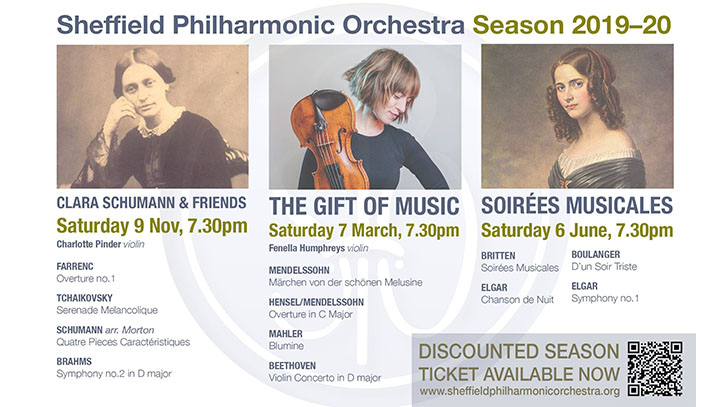
Sheffield Philharmonic Orchestra’s 2019-20 Season
The orchestra had played new works and music by women composers before, but it wasn’t something they did regularly or something they were in a habit of doing and so — at that time — playing a piece by a woman composer in every concert was quite novel.
We planned and budgeted the whole season in advance and hoped we could get audiences through the doors with these new and quite different programmes. Audience attendance stayed standard for our first concert of the season, but feedback from the audience and the orchestra members was fantastic — George even won a Making Music Award for his arrangement of the Clara Schumann piece! The second concert was almost a sell-out, largely due to our incredible soloist Fenella Humphreys but, again, the programme was very well-received by audience and orchestra.
A couple of weeks after that second concert the UK entered Covid-19 lockdown, and it would be another two years before we could finally play our third concert featuring a woman composer.
Like many leisure-time groups faced with Covid-19 restrictions, we switched to online rehearsals and stayed connected as best we could: getting to grips with Zoom, listening along to the music together, and playing sections of music through. But things were about to change in a major way culturally.
On 25 May 2020, George Floyd's murder in Minneapolis sparked the largest racial justice protests in the United States since the civil rights movement. The Black Lives Matter movement went far beyond the borders of the USA — it inspired a global reckoning with racism. Many individuals started looking within, and many organisations began reevaluating their commitments to diversity and inclusion. Following the events in Minneapolis, the Donne Foundation’s 2021 report went into much deeper detail than ever before about representation in the industry, and the results are shocking but unsurprising.
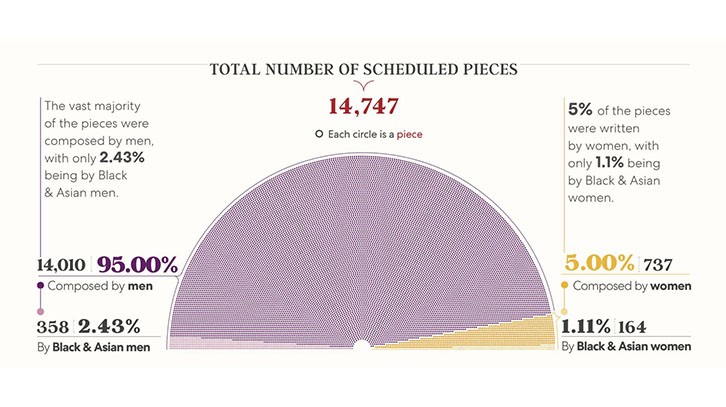
Equality & Diversity in Concert Halls (Donne, Women in Music, 2021)
Although programming music by women composers was already something on George and the Sheffield Philharmonic’s agenda, on reflection we realised that we weren’t doing enough as a whole in terms of diversity.
SPO were one of the first groups to resume rehearsals after restrictions were lifted, but we were determined to do things differently in a post-Covid world. George’s 2021-22 season plans featured a greater diversity than ever before, and also he proposed that the orchestra adopt a policy to address inequality and endeavour to include repertoire by underrepresented composers in every concert. The SPO committee were fully on board with this, and together they have worked to challenge biases and foster an inclusive environment that actively promotes diversity.
How it’s going
Since we adopted this approach - alongside other implementations from our action plan - the orchestra has gone from strength to strength. We have increased our average audience size by 52%, and we have achieved our goal of financial stability, but – as importantly - we are now a much more inclusive orchestra. We’re not perfect (no organisation is!), but we continue to strive for continuous improvement and EDI has become one of our core values.
In our last two end-of-season member surveys, players have commented positively about the range and diversity of repertoire, and feedback from our audience has been overwhelmingly positive too.
'I have enjoyed playing some different repertoire this year; I have been playing for over 60 years and I have done nearly all the standard pieces.' - SPO member
What we’ve learned
Adopting a progressive programming policy has undoubtedly been a success for us. The players have enjoyed exploring new pieces, and our audience hasn’t been put off attending concerts with programmes featuring unfamiliar works by unfamiliar names. It’s become a bit of a unique selling point for us in a sense as it differentiates us from the other orchestras in our area.
The pieces can sometimes be hard to source and/or expensive to hire, but so can lesser-known works from composers in the classical canon, or music by in-copyright composers like Shostakovich or Vaughan Williams. We no longer view this as something prohibitive, or as an excuse to do something better known or more populist, but as an opportunity to challenge ourselves to make it work.
As the Donne Foundation puts it:
'For equality and diversity to become a reality in our concert halls, it is important that we move beyond tokenism for political correctness and aim for comprehensive and genuine inclusivity.'
Find out more about the Sheffield Philharmonic Orchestra on their website.
Check out The Donne's list of women composers.
To expand your repertoire, check out these Making Music resources:
- Adopt a Music Creator legacy scores
- Guide to commissioning new music
- Discounts on the largest music library and database
- Discounts on purchasing, hiring and commissioning music
We hope you find this Making Music resource useful. If you have any comments or suggestions about the guidance please contact us. Whilst every effort is made to ensure that the content of this guidance is accurate and up to date, Making Music do not warrant, nor accept any liability or responsibility for the completeness or accuracy of the content, or for any loss which may arise from reliance on the information contained in it.





